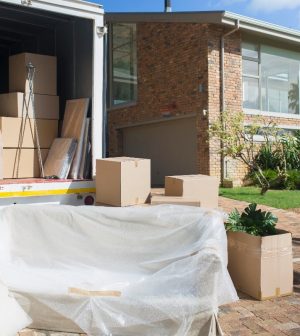- Could Your Grocery Store Meat Be Causing Recurring UTIs?
- Are You Making This Expensive Thermostat Error This Winter?
- Recognizing the Signs of Hypothyroidism
- 10 Strategies to Overcome Insomnia
- Could Artificial Sweeteners Be Aging the Brain Faster?
- Techniques for Soothing Your Nervous System
- Does the Water in Your House Smell Funny? Here’s Why
- Can a Daily Dose of Apple Cider Vinegar Actually Aid Weight Loss?
- 6 Health Beverages That Can Actually Spike Your Blood Sugar
- Treatment Options for Social Anxiety Disorder
Americans Are Moving Away From Polluted Areas — If They Can Afford To

Americans of means are fleeing heavily polluted places in the United States for cleaner locales, a new study has found.
Pollution levels are a factor in families’ decision to move within the United States, but only richer households can afford to move to areas with better air quality, researchers reported recently in the journal Environmental and Resource Economics.
“We find inequalities exist when it comes to who is exposed to the worst areas of pollution — with poorer families hit hardest,” said researcher Aurelie Slechten, a senior lecturer in economics with Lancaster University in the U.K.
“Richer households opt to move into cleaner, healthier areas that tend to be more expensive,” Slechten added in a university news release. “However, poorer families are priced out of these counties and are the ones who move into areas with higher levels of toxic releases.”
For the study, researchers used IRS data files to track the movement of families between the 3,109 counties located in the continental United States between 2010 and 2014.
They compared that movement to data from the Environmental Protection Agency showing the average air quality and number of pollution-spewing industries located in each county.
People who move to a location that’s less polluted tend to earn more than the average household income in the place they’re leaving, results show.
On the other hand, families with a lower-than-average income tend to either stay put or move to more polluted destinations, researchers found.
“This evidence demonstrates it is not just improvements to air quality standards and Toxic Release Inventory reporting that are important when it comes to environmental justice — inequality in income also needs to be considered, as it is clear some families may be forced to live in more polluted areas, which may lead them to live unhealthier lives,” said researcher Dr. Anita Schiller, a senior lecturer in economics with Lancaster University.
These findings jibe with earlier studies that showed companies tend to locate pollution-spewing factories in lower-income areas, researchers said.
“This creates a vicious cycle, where firms strategically locate polluting facilities in lower-income areas, and the resulting environmental burdens then fall disproportionately on disadvantaged communities,” said researcher Dakshina De Silva, a professor of economics with Lancaster University. “Wealthier households, meanwhile, are able to effectively ‘vote with their feet’ and avoid these negative impacts.”
More information
The Cleveland Clinic has more on the health effects of pollution.
SOURCE: Lancaster University, news release, Aug. 22, 2024
Source: HealthDay
Copyright © 2026 HealthDay. All rights reserved.










